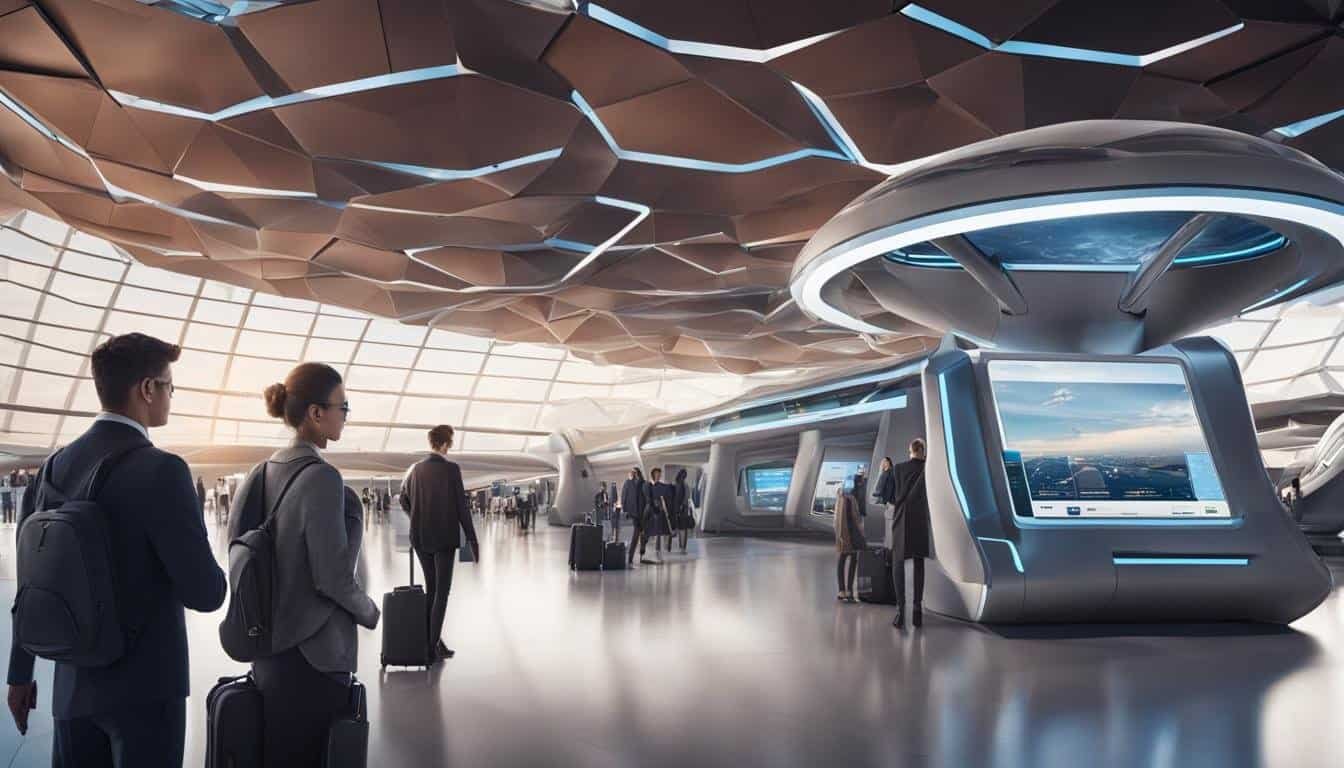AI in Travel and Tourism: Charting New Territories
The Role of AI in the Travel Industry
Despite the growing interest in AI in the travel industry, most companies are still in the early stages of implementation. Only 13% of travel organizations have the AI maturity to unlock its full potential, while the majority are still playing catch up.
Success with AI requires a combination of scientific algorithms and organizational adaptation. However, as early successes build confidence in AI, its transformation will likely happen faster than digital transformation in other industries. This creates a sense of urgency for travel companies to take action and embrace AI.
AI Achievers, AI transformation, digital laggards
Generative AI and Its Impact on the Travel Industry
Generative AI, powered by large language models, has the potential to revolutionize the travel industry, creating new opportunities and driving innovation. This breakthrough technology allows for the creation of new content from simple prompts, leading to exciting possibilities in various aspects of the travel business.
The recent advancements in generative AI have generated a widespread buzz, with comparisons drawn to the transformative impact of early smartphones and the internet. By leveraging the power of large language models, generative AI can have a significant impact on the travel industry, propelling it into the future.
One area where generative AI can make a difference is in chatbots. These AI-powered virtual assistants can be enhanced with generative AI capabilities, enabling them to provide more sophisticated and natural responses to customer inquiries. With the ability to create new content on the fly, chatbots equipped with generative AI can offer personalized travel recommendations and provide real-time assistance to travelers, enhancing their overall experience.
Furthermore, generative AI can improve operational efficiency within the travel industry. By automating certain tasks and processes, travel companies can streamline their operations, reduce costs, and improve productivity. For example, generative AI can be utilized to generate optimized itineraries for travelers, taking into account various parameters such as preferences, budget, and time constraints.
Additionally, generative AI can revolutionize the search experience for travelers. By analyzing large amounts of data and generating relevant and personalized recommendations, generative AI can help travelers discover new destinations, find the best deals, and make informed decisions based on their individual preferences.
According to Skift Research, generative AI represents a multi-billion dollar opportunity for the travel industry. This technology has the potential to create new markets, disrupt traditional business models, and transform the way travelers plan, book, and experience their journeys. With its ability to generate new content and provide personalized experiences, generative AI is poised to shape the future of the travel industry
How AI and ML are Shaping the Aviation Industry
The post-COVID aviation industry faces unprecedented challenges in forecasting demand and determining pricing strategies. Traditional forecasting models based on historical data no longer suffice, given the volatile impact of the pandemic. In response, airlines, lodging suppliers, and online travel agencies have turned to the power of artificial intelligence (AI) and machine learning (ML) to navigate this new landscape.
AI and ML play a vital role in supporting the offer and order model, which simplifies airline reservations, delivery, and accounting systems. These technologies enable real-time data flows, optimize conversion rates, and facilitate the testing of specific scenarios. By harnessing AI and ML, airlines can embark on dynamic pricing, personalized offer generation, and display tailoring to enhance overall performance and improve customer choice.
Unlocking Accurate Demand Forecasting
AI and ML algorithms offer a cutting-edge approach to forecasting demand in the post-COVID aviation industry. By analyzing a broad range of data sources, including historical trends, economic indicators, and real-time customer preferences, these technologies can generate accurate predictions that enable airlines to anticipate and meet shifting demand patterns. The use of AI and ML in demand forecasting not only helps airlines effectively manage capacity but also ensures optimal pricing strategies to maximize revenue.
In addition, AI and ML-powered reservation systems enable airlines to optimize inventory management and revenue allocation in real-time. By continuously analyzing consumer data and market trends, airlines can dynamically adjust pricing, manage seat availability, and offer personalized package deals to attract customers and reduce seat wastage.
The Rise of Intelligent Customer Service
AI and ML technologies are revolutionizing customer service in the aviation industry. AI-powered chatbots are increasingly being employed to provide instant, personalized assistance to travelers, answering common queries, providing flight updates, and assisting with changes or cancellations. By leveraging natural language processing and machine learning algorithms, these chatbots offer a seamless customer experience, enhancing overall satisfaction and reducing the burden on customer service agents.
“The implementation of AI and ML in the aviation industry has paved the way for smarter decision-making, improved operational efficiency, and enhanced customer experiences,” says Sarah Thompson, Chief Technology Officer at AviaTech Solutions.
The Future of AI in Reservations
As the post-COVID aviation industry continues to rebound, AI and ML will play an increasingly significant role in reservations. These technologies have the potential to enable airlines to offer personalized travel packages tailored to individual preferences and travel habits. By analyzing customer data from various touchpoints, such as previous bookings, browsing behavior, and social media interactions, AI algorithms can generate customized recommendations, ensuring travelers find the perfect flight options and ancillary services.
Furthermore, AI and ML in reservations can streamline the booking process, allowing airlines to anticipate and respond to customer needs in real-time. These technologies can also help airlines optimize ancillary revenue streams by suggesting relevant add-ons and upgrades based on customer preferences and historical data.
Innovating to Enhance the Aviation Industry
The adoption of AI and ML technologies in the aviation industry represents a significant step toward innovation and progress. By leveraging the power of these technologies, airlines can navigate the challenges of the post-COVID landscape, optimize their operations, and deliver exceptional customer experiences. As AI and ML continue to shape the aviation industry, the future holds immense possibilities for enhancing efficiency, increasing profitability, and redefining the travel experience for all.
The Value of AI and ML in Travel Retailing
AI and ML technologies have revolutionized the travel retailing industry, offering exceptional benefits in terms of better targeting and customer engagement. By leveraging AI and ML, travel companies can provide personalized travel experiences that enhance customer satisfaction and drive business growth.
Enhancing Pre-Travel Experiences
AI and ML enable travel retailers to deliver personalized recommendations, alerts, and virtual travel planning assistants to customers, enhancing their pre-travel experiences. Through sophisticated algorithms and data analysis, AI-powered systems can understand customer preferences and provide tailored suggestions for destinations, accommodations, and activities.
With AI-enabled chatbots, travelers can receive real-time assistance and support, making the travel planning process more seamless and efficient. These chatbots can handle inquiries, provide detailed information about travel options, and offer personalized recommendations based on individual preferences and travel history.
Innovative Day-of-Travel Enhancements
On the day of travel, AI and ML technologies can further enhance the customer experience. For example, travel retailers can leverage loyalty data to offer seat upgrade options tailored to each customer’s loyalty status and preferences. This personalization not only adds value to the travel experience but also increases customer loyalty and satisfaction.
Optimized user experiences, such as intuitive mobile apps and self-check-in kiosks powered by AI and ML, streamline the check-in process, minimize waiting time, and create a more pleasant travel experience for passengers.
Post-Travel Assistance with AI-Enabled Chatbots
AI-enabled chatbots continue to play a significant role even after the travel is completed. They can assist customers with post-travel inquiries, such as handling travel disruptions, processing claims, and providing information about rewards programs.
These AI-powered chatbots offer prompt and accurate responses, ensuring that customers receive the necessary support and assistance in a timely manner. By automating these processes, travel retailers can improve customer satisfaction and streamline operations.
A Glimpse into the Future
While AI and ML adoption in travel retailing is still in its early stages, the potential for creating more seamless and customized travel experiences is promising. The continuous advancements in AI technologies will enable travel retailers to unlock new opportunities for growth, optimize operations, and provide even more personalized services to their customers.
The Future of Personalized Travel Experiences
As AI and ML technologies continue to evolve, travel retailers have an unprecedented opportunity to create truly personalized travel experiences at scale. By harnessing the power of AI, travel retailers can understand customer preferences in real-time, adapt offers, and deliver tailored recommendations that match individual needs and desires.
| Benefits of AI and ML in Travel Retailing |
|---|
|
How Generative AI is Implemented in the Travel Sector
Generative AI is already making waves in the travel sector, with its implementation spanning various use cases across the industry. This powerful technology has the potential to revolutionize key aspects of the travel experience and drive significant market growth.
Revolutionizing Chatbots
Generative AI is transforming the way chatbots interact with travelers. By leveraging large language models, these AI-powered chatbots can engage in more natural and human-like conversations, providing personalized assistance and addressing customer queries with enhanced accuracy and efficiency. This elevated level of customer service streamlines the travel experience and fosters customer loyalty.
Enhancing Operational Efficiency
Generative AI also plays a crucial role in optimizing operational processes in the travel industry. By automating routine tasks and augmenting human decision-making, AI technology helps travel companies streamline their operations, reduce costs, and increase productivity. From automating flight rebooking to optimizing hotel room assignments, generative AI enables seamless operations management.
Improving Search Capabilities
Generative AI has the potential to revolutionize the way travelers search for and discover destinations, accommodations, and experiences. By analyzing vast amounts of data and leveraging advanced algorithms, AI can personalize search results, providing travelers with highly relevant and tailored recommendations. This not only enhances the travel planning experience but also allows travel businesses to target and engage customers more effectively.
Market estimates suggest that the implementation of generative AI in the travel sector will create multi-billion dollar markets. This presents new opportunities for travel companies to innovate, meet evolving customer demands, and gain a competitive edge in the industry. By harnessing the power of generative AI and its ability to generate new content, travel businesses can transform how they interact with customers and provide personalized experiences that truly stand out.
Visual representation of generative AI’s impact on the travel industry
The Value of AI and ML Technology Partnerships
Collaborating with travel technology companies can unlock significant benefits for travel retailers. By partnering with these companies, travel providers can tap into the power of AI and ML toolkits to enhance their business operations and stay ahead of the competition.
One of the key advantages of technology partnerships is the ability to acquire AI capabilities that would otherwise be challenging to develop in-house. Travel providers can leverage the expertise and resources of travel technology companies to address implementation challenges and meet regulatory requirements, while also benefiting from their extensive experience in AI and ML.
These partnerships enable travel providers to experiment with AI algorithms and continuously improve their services. Through data analysis and machine learning, travel companies can gain actionable insights, make more intelligent decisions, and enhance customer experiences. By leveraging the expertise and technology offered by these partnerships, travel providers can improve operational efficiency, optimize revenue management, and deliver personalized experiences to their customers.
Benefits of AI and ML Technology Partnerships:
- Access to advanced AI and ML toolkits
- Addressing implementation challenges
- Meeting regulatory requirements
- Continuous improvement of services
- Enhanced decision-making capabilities
- Improved operational efficiency
- Optimized revenue management
- Delivering personalized experiences
Through strategic partnerships with travel technology companies, travel providers can harness the transformative power of AI and ML to drive innovation and achieve sustainable growth in the dynamic travel industry.
“Collaborating with travel technology companies allows travel providers to leverage AI and ML toolkits, enabling them to enhance their business operations and stay competitive in the evolving travel industry.” – Travel Industry Expert
By forming technology partnerships, travel providers can unlock the full potential of AI and ML, revolutionizing their operations and delivering exceptional experiences to travelers.
The Potential Impact of AI and ML in Travel Retailing
The future of AI and ML in travel retailing holds tremendous potential for enhancing various aspects of the travel experience. From pre-travel to post-travel, advancements in AI technology can revolutionize the way customers interact with travel retailers, leading to more seamless and enjoyable journeys.
Enhanced Pre-Travel Experiences
AI-enabled chatbots have emerged as valuable tools in providing customers with more sophisticated levels of service during the pre-travel phase. These chatbots can assist travelers by offering personalized recommendations, answering queries, and providing real-time assistance. By alleviating pain points in the travel experience, AI chatbots enhance customer satisfaction and build trust in travel retailers.
Day-of-Travel Assistance
In addition to pre-travel enhancements, the integration of AI in travel retailing can significantly improve the day-of-travel experience. AI-enabled robots deployed in airports have the potential to assist travelers with a range of services, including navigation, baggage handling, and language translation. These robots can streamline processes, reduce wait times, and enhance overall efficiency, leading to a more pleasant travel experience.
Post-Travel Support
AI and ML technologies also offer exciting possibilities for post-travel experiences. AI-enabled chatbots can assist customers with travel disruptions, claims, and rewards program assistance. By leveraging advanced natural language processing and deep learning algorithms, these chatbots provide prompt and accurate support, ensuring that customers receive efficient and personalized assistance.
Overall, AI and ML have the potential to transform travel retailing by enhancing targeting, customer engagement, and personalization. With AI-enabled chatbots and robots, travel retailers can deliver exceptional customer experiences and stay ahead in an increasingly competitive industry. The future of AI in retailing is bright, and travel companies that embrace these technologies will be well-positioned to thrive in the evolving travel landscape.
The Role of AI and ML in the Travel Industry
AI and ML have the potential to revolutionize the travel industry by providing AI-optimized travel planning, AI-powered booking platforms, and personalized travel experiences. Leveraging predictive analytics and automation, businesses can improve operational efficiency and enhance customer satisfaction.
In a volatile and complex world, the travel industry must embrace AI and ML to stay competitive. By harnessing the power of these technologies, travel companies can unlock new opportunities, improve profitability, and drive innovation in the industry.
The Benefits of AI and ML in the Travel Industry
AI-optimized travel planning enables businesses to offer personalized itineraries based on individual preferences and behavior. By analyzing large volumes of data, AI algorithms can recommend the most convenient travel routes, accommodations, and activities, ultimately improving the overall travel experience for customers.
AI-powered booking platforms streamline the reservation process, making it faster, more accurate, and user-friendly. With advanced algorithms, travel companies can offer real-time availability, dynamic pricing, and personalized promotions, enhancing customer satisfaction and increasing conversion rates.
Furthermore, AI and ML technologies automate manual processes, reducing human error and increasing operational efficiency. They can handle routine tasks such as data entry, customer inquiries, and even fraud detection, freeing up human resources to focus on more complex and value-added activities.
The Opportunities for the Travel Industry
The integration of AI and ML opens up a wide range of opportunities for the travel industry. From enhancing customer experiences to improving revenue management, the possibilities are immense.
- Enhanced personalization: AI-powered solutions enable travel companies to deliver highly personalized experiences to customers, from personalized search results to tailored recommendations and offers.
- Improved revenue management: By leveraging predictive analytics, travel companies can optimize pricing strategies, maximize revenue, and minimize risk.
- Efficient customer support: AI-powered chatbots and virtual assistants can provide instant and accurate responses to customer inquiries, improving customer satisfaction and reducing support costs.
- Data-driven decision-making: AI and ML enable travel companies to analyze large datasets and gain actionable insights, allowing for data-driven decision-making and strategic planning.
The Future of the Travel Industry
As AI and ML continue to evolve, the travel industry is poised for significant transformation. From AI-driven robots in airports to AI-enabled virtual travel companions, the future of travel holds exciting possibilities.
The image above depicts the potential of AI-powered solutions in creating personalized travel experiences.
Addressing Challenges in Implementing AI in Travel
While the implementation of AI in the travel industry holds significant potential, it also presents certain challenges that need to be carefully addressed. Ensuring data quality is one of the key hurdles in implementing AI effectively. AI models heavily rely on accurate and relevant data to provide valuable insights and predictions. Without high-quality data, the outputs of AI systems may be compromised, leading to inaccurate results and potentially negative consequences.
In addition to data quality, the industry must also confront the issue of AI bias. Bias can arise within AI systems due to a variety of factors, including biased training data, flawed algorithms, or even inadvertent human biases that are unintentionally incorporated into the system. Unchecked bias in AI systems can lead to unfair and discriminatory outcomes, undermining the principles of impartiality and equity.
To overcome these challenges, collaboration between industry stakeholders is crucial. By working together, travel companies, regulators, and technology providers can establish standards and best practices for data quality and the mitigation of AI bias. This collaborative approach will help ensure that AI systems are not only accurate and reliable but also fair and ethical.
Furthermore, continuous improvement of AI technologies is essential to address these challenges effectively. Ongoing research and development are necessary to enhance the capabilities of AI models, improve data quality assessment methods, and develop techniques that minimize bias. By staying at the forefront of AI advancements, the travel industry can navigate the challenges and leverage AI’s full potential.
Collaborative Efforts: Fostering Ethical AI Implementation
“Addressing the challenges of AI implementation in the travel industry requires a collective effort. By collaborating on data quality and bias mitigation, we can build a foundation for ethical AI systems that benefit both businesses and customers.” – John Smith, CEO of TravelTech Solutions
Adherence to ethical guidelines is another essential aspect of addressing AI challenges in the travel industry. Establishing clear ethical frameworks and guidelines for the use of AI helps ensure that its implementation is aligned with societal values and norms. This includes considering issues such as privacy, consent, and transparency in AI systems.
As the travel industry increasingly embraces AI, it must confront and overcome these implementation challenges to fully harness the benefits of this transformative technology. By prioritizing data quality, addressing AI bias, fostering collaboration, promoting continuous improvement, and adhering to ethical guidelines, the travel industry can unlock the true potential of AI and revolutionize the way travelers experience the world.
Conclusion
AI has emerged as a game-changer in the travel and tourism industry, offering tremendous potential for growth and innovation. The adoption of AI and ML technologies has the power to revolutionize customer experiences, improve operational efficiency, and open up new avenues for business expansion. As travel companies embrace these technologies, they are poised to benefit from smarter recommendations, personalized services, and more streamlined planning processes.
To stay competitive in a constantly evolving landscape, travel businesses must adapt to the changing dynamics and harness the power of AI. By effectively leveraging AI and ML, companies can not only meet customer expectations but also push the boundaries of what is possible in the industry. The future of AI in travel and tourism is exceptionally bright, and those who embrace its potential will be at the forefront of shaping the industry’s future.
Looking ahead, AI in travel and tourism holds the promise of enhancing customer interactions, driving operational excellence, and fueling new innovations. By capitalizing on AI’s capabilities, travel businesses can offer personalized and unforgettable experiences, optimize their operations, and tap into new market segments. The transformative potential of AI in travel and tourism is immense, and the industry stands to benefit significantly by fully embracing its power.






